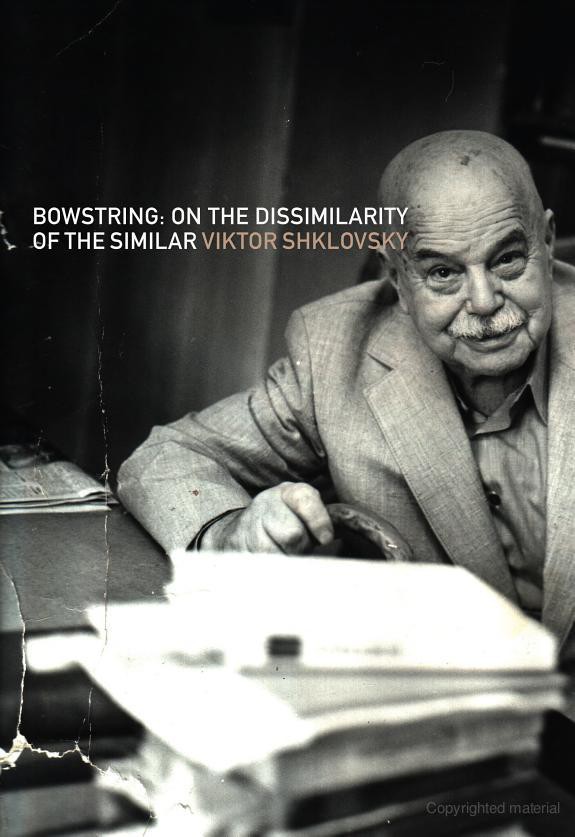Viktor Shklovsky: Bowstring: On the Dissimilarity of the Similar (1970/2011) [RU, EN]
Filed under book | Tags: · literary criticism, literary theory, literature, poetry

“Myths do not flow through the pipes of history,” writes Viktor Shklovsky, “they change and splinter, they contrast and refute one another. The similar turns out to be dissimilar.” Published in Moscow in 1970 and appearing in English translation for the first time, Bowstring is a seminal work, in which Shklovsky redefines estrangement (ostranenie) as a device of the literary comparatist—the “person out of place,” who has turned up in a period where he does not belong and who must search for meaning with a strained sensibility. As Shklovsky experiments with different genres, employing a technique of textual montage, he mixes autobiography, biography, memoir, history, and literary criticism in a book that boldly refutes mechanical repetition, mediocrity, and cultural parochialism in the name of art that dares to be different and innovative. Bowstring is a brilliant and provocative book that spares no one in its unapologetic project to free art from conventionality.
Тетива. О несходстве сходного
Publisher Sovetskii pisatel’, Moscow, 1970
English edition
Translated by Shushan Avagyan
Publisher Dalkey Archive Press, 2011
John F. Byrne Literature series
ISBN 1564784258, 9781564784254
456 pages
Review (Jonathan Foltz, Los Angeles Review of Books)
Review (Bruce Stone, Cinq Magazine)
Publisher (EN)
Google books (EN)
Tetiva: o neskhodstve skhodnogo (Russian, 1970, HTML), Alt link.
Bowstring: On the Dissimilarity of the Similar (English, 2011, EPUB), Alt link.
Walter Benjamin: Selected Writings, Volume 1: 1913–1926 (1996)
Filed under book | Tags: · aesthetics, language, literary criticism, literature, philosophy, translation, weimar republic, writing

“Walter Benjamin emerged from the head-on collision of an idealistic youth movement and the First World War, which Benjamin and his close friends thought immoral. He walked away from the wreck scarred yet determined “to be considered as the principal critic of German literature.” But the scene, as he found it, was dominated by “talented fakes,” so—to use his words—“only a terrorist campaign would I suffice” to effect radical change. This book offers the record of the first phase of that campaign, culminating with “One Way Street,” one of the most significant products of the German avant-garde of the Twenties. Against conformism, homogeneity, and gentrification of all life into a new world order, Benjamin made the word his sword.
Volume I of the Selected Writings brings together essays long and short, academic treatises, reviews, fragments, and privately circulated pronouncements. Fully five-sixths of this material has never before been translated into English. The contents begin in 1913, when Benjamin, as an undergraduate in imperial Germany, was president of a radical youth group, and take us through 1926, when he had already begun, with his explorations of the world of mass culture, to emerge as a critical voice in Weimar Germany’s most influential journals.
The volume includes a number of his most important works, including “Two Poems by Friedrich Hölderlin,” “Goethe’s Elective Affinities,” “The Concept of Criticism in German Romanticism,” “The Task of the Translator,” and “One Way Street.” He is as compelling and insightful when musing on riddles or children’s books as he is when dealing with weightier issues such as the philosophy of language, symbolic logic, or epistemology. We meet Benjamin the youthful idealist, the sober moralist, the political theorist, the experimentalist, the translator, and, above all, the virtual king of criticism, with his magisterial exposition of the basic problems of aesthetics.
Benjamin’s sentences provoke us to return to them again and again, luring us as though with the promise of some final revelation that is always being postponed. He is by turns fierce and tender, melancholy and ebullient; he is at once classically rooted, even archaic, in his explorations of the human psyche and the world of things, and strikingly progressive in his attitude toward society and what he likes to call the organs of the collective (its architectures, fashions, signboards). Throughout, he displays a far-sighted urgency, judging the present on the basis of possible futures. And he is gifted with a keen sense of humor. Mysterious though he may sometimes be (his Latvian love, Asia Lacis, once described him as a visitor from another planet), Benjamin remains perhaps the most consistently surprising and challenging of critical writers.”
Some parts first appeared in Gesammelte Schriften, Band I, Suhrkamp, Frankfurt, 1972
Edited by Marcus Bullock and Michael W. Jennings
Publisher Belknap Press, 1996
ISBN 0674945859, 9780674945852
528 pages
via Scribd.com
Review (J.M. Coetzee, The New York Review of Books)
Review (Eli Friedlander, boundary 2)
PDF (no OCR)
Comments (2)Albert Camus: Lyrical and Critical Essays (1967/1970)
Filed under book | Tags: · literary criticism, literature

This book presents Camus’ three little volumes of essays, plus a selection of his critical comments on literature and on his own place in it.
First published by Hamish Hamilton, 1967, in a translation by Philip Tody, under the title Lyrical and Critical
Edited and with Notes by Philip Thody
Translated from the French by Ellen Conroy Kennedy
Publisher Vintage Books, 1970
eISBN 9780307827784
Review (J.W. Burrow, The Saturday Review)
Comment (0)
